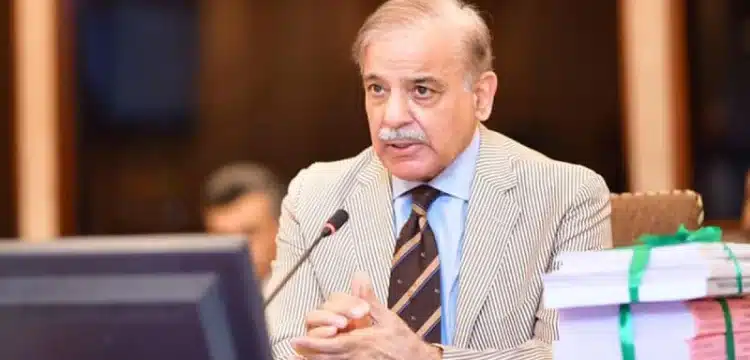[vc_row][vc_column][vc_column_text dp_text_size=”size-4″]In light of significant differences between Islamabad and the International Monetary Fund over budget calculations, Prime Minister Shehbaz Sharif on Monday made contact with almost a dozen significant international capitals to inform them of Pakistan’s efforts to resurrect the $6.5 billion bailout package.
At least three attendees of the conference told The Express Tribune that the prime minister held a background meeting with the ambassadors from Western, European, and Asian nations. The meeting, which could have been the last of its kind, was held just 11 days before the current IMF programme expired.
According to a meeting participant who spoke on the condition of anonymity, the prime minister informed the foreign ambassadors of the efforts he and Finance Minister Ishaq Dar personally made over the course of the previous several months.
According to the sources, the prime minister once more expressed the government’s desire to receive at least the $1.2 billion tranche of the $2.6 billion that is contingent upon the conclusion of the ongoing 9th review.
According to the sources, the administration had invited the ambassadors of the US, UK, France, Germany, European Union, Japan, China, Saudi Arabia, Qatar, and the United Arab Emirates.
Also Read: Pakistan’s former PM Imran Khan says he will fight even if they imprison him.
Another meeting participant reported that some ambassadors asked the government for clarifications while assuring them that they would inform their capitals of Pakistan’s position. Additionally, the ambassadors communicate with IMF personnel.
After the meeting, the PM’s office didn’t make any official statements.
According to the sources, the economic team relied on the finance minister’s first efforts to call the IMF team for review talks in October of last year. However, it took the IMF three months to react to the invitation. According to the officials, the country implemented all the agreed-upon measures in February, including a mini-budget of Rs170 billion, higher power and gas prices, higher interest rates and letting market forces determine the exchange rate.
The finance ministry reports that the only issue left to be resolved was the external financing gap, which was likewise resolved on May 27 over the phone during a conversation between the prime minister and IMF Managing Director Kristalina Georgieva.
However, there are still differences between Pakistan’s and the IMF’s viewpoints, notably when it comes to the proposed budget’s revisions, the rise in the monthly stipend for the Benazir Income Support Programme, the increase in petroleum levy rates, and the correction of the foreign exchange market.
According to Pakistani authorities, the current account deficit has significantly improved, which has allowed for the external financing gap to be closed. They claimed that, as opposed to the IMF’s projection of a $7 billion yearly deficit, the deficit during the first 11 months of the current fiscal year was only $2.9 billion.
Additionally, the current account recorded a surplus of $255 million in May, according to data released by the central bank on Monday. As a result, the current account only had a deficit of $2.94 billion from July to May of the current fiscal year as opposed to a deficit of $15.16 billion during the same time of the previous fiscal year.
Dar is credited with significantly reducing the deficit, which has so far assisted in preventing the impending default.
However, despite the nation receiving $1 billion from the China Development Bank, the official foreign exchange reserves as of Friday were still close to $3.5 billion. Last Friday, the nation paid back a $300 million loan to the Bank of China and more than a dozen smaller payments totaling $350 million to other multilateral creditors.
However, the sources claimed that the $300 million in Chinese finance that is anticipated to be received soon may cause the reserves to increase to $3.8 billion by Wednesday.
According to the sources, the prime minister also spoke about his correspondence with the IMF managing director, particularly the three letters he sent to Georgieva in less than a month. According to the sources, the PM wrote letters to the managing director on May 19, June 12 following the introduction of the budget, and June 16.
According to sources in the finance ministry, the IMF responded to the letters on each occasion and provided a different perspective of the outstanding steps that Pakistan, in the IMF’s opinion, still needs to perform in order to complete the 9th review.
The prime minister addressed the effective operation of the foreign exchange market, budgetary measures, and the elimination of electricity subsidies in his letters.
According to sources in the finance ministry, the IMF guaranteed in response to the letters that it was eager to conclude the 9th review subject to the completion of the outstanding actions.
They also mentioned that the IMF had once more requested that the projected budget be brought into compliance with the program’s goals and that the $100,000 tax amnesty initiative be withdrawn.
According to sources, the IMF has also requested Pakistan offer the 9.3 million recipients of the Benazir Income Support Programme (BISP) a boost that is adjusted for inflation. According to the administration, the stipend has already increased by 25%.
The government has also been urged by the IMF to raise the petroleum tax from Rs10 to Rs60 per litre. The provinces were asked by the IMF to give unwavering commitments for producing cash surpluses.
According to Bloomberg, if the IMF plan is not revived, there would likely be a severe dollar shortage for the first half of the upcoming fiscal year, which begins in July, and maybe for longer. This will increase the likelihood that the country will fail dramatically.
According to the analysis published on Monday, the situation would also enhance the possibility of fiscal 2024 seeing substantially weaker growth, as well as greater inflation and interest rates than we presently predict.
It further stated that Pakistan must return an additional $4 billion between July and December, which cannot be carried over. “Default seems highly likely,” says the statement, “with FX reserves likely below $4 billion at the start of fiscal 2024.”
According to the article, talks with the IMF about a potential fresh bailout won’t likely begin until after the October elections.
[/vc_column_text][/vc_column][/vc_row]











